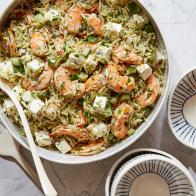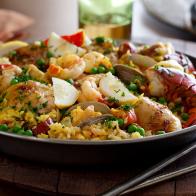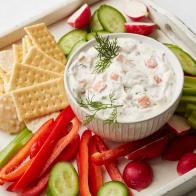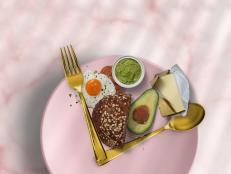What Is the Anti-Inflammation Diet?
Though it’s not a strictly defined diet per se, eating certain foods can help prevent or even fan the flames of inflammation.

Claudia Totir/Getty Images
One of the most-asked dietitian questions I get is “What do you know about inflammation?” There is so much information and misinformation swirling out there about a so-called inflammation diet, that it’s not surprising people are confused.
What Is Inflammation?
There are two types of inflammation: acute inflammation and chronic inflammation.
Acute inflammation occurs when your body goes into action against a threat, such as an injury, or invading germs that could cause illness. The immune response kicks into high gear to isolate the illness-causing microbes or to heal damaged tissue like a cut finger. Most importantly, this response powers down to normal when well-being is restored.
Chronic inflammation is a result of your body kicking into overdrive constantly, overworking the immune system. There’s a lot we don’t understand about this condition, especially since it doesn’t have specific diagnosable symptoms; but they could include headaches, joint pain, digestive issues, new allergies or food sensitivities, acne and eczema, high blood pressure, brain fog, low energy and more.
There are many causes of chronic inflammation, but in general it results from unresolved autoimmune reactions or irritations from allergens/chemical toxins or from continuous stress.
Now, few of us live with zero stress! But ongoing lifestyle habits can compound together to stress body systems; these stressors could include too little sleep, irregular exercise, inability to manage emotional health, and what you eat and don’t eat.
Inflammation and Gut Health
The gut is one of the largest organs of the immune system. If the gut isn’t healthy, it’s hard for the immune system to do its job. The gut manages most of the ‘things’ (food and beverages) we put into our bodies. So how do we nourish our gut to help it fulfill its immune function? The answer is an anti-inflammation diet.

Zoryana Ivchenko/Getty Images
What Is the Anti-Inflammation Diet?
The anti-inflammation diet is not a specific diet, per se. But the foods that fight inflammation and certain eating habits can be described as a combination of the best advice from eating lifestyles around the world, including the Mediterranean diet, the Nordic diet, the DASH diet, the MIND diet and lower-carb diets.
Here’s an overview of what and how to eat:
Slow Down and Savor: It might surprise you that the first part of an anti-inflammation diet is about eating slowly. But there are so many benefits to this practice. Chewing your food well helps your body to digest it better. Savoring the taste of each bite helps to bring the feeling of satisfaction after eating. The practice of enjoying food with others, or conviviality is a major focus of the Mediterranean diet. It has been linked with many brain benefits, as the habit of eating and talking with others (even strangers at a communal table) are hard to deny. This may also be the most difficult part of the anti-inflammation diet!
Do this: Eat at a communal table and make new friends. Dine with an elderly relative over a video-chat. Have family dinner, even eating with the family in the car counts if you slow down and enjoy your food.
Eat More Beans and Legumes: Beans, peas, lentils are high-fiber, low-GI (glycemic index) foods and are one of the best foods for nourishing the gut. They’re also one of the most budget-friendly. But lots of us need to eat more.
Do this: Find a version of canned beans you like and eat for a quick lunch along with whole grain toast or tortillas; try chili beans, seasoned black beans, baked beans (look for the least added sugar) or canned lentils. Get at least four servings per week.
Add Herbs: Not only do these plants have lots of potent inflammation-stopping antioxidants, but they count as ‘eating your greens.’ Bright green basil, cilantro, dill, mint, parsley, rosemary, sage and tarragon are all rich sources of anti-inflammatory phytochemicals called carotenoids.
Do this: When a recipe calls for one tablespoon of herbs, use one cup instead! Toss inexpensive parsley or cilantro into soups, stews, sandwiches, salads, pasta dishes, or into a pot of whole grain polenta, brown rice, quinoa or bulgur. Try to get herbs in daily.
Reach for Fruit (and Vegetables): Most of us could be eating more fruits. And while variety is good, high-fiber berries and citrus fruit are great. Grab a fruit instead of a packaged snack. Frozen, dried and canned fruits along with fresh fruits are all packed with antioxidants.
Do this: Eat fruit for dessert at least three times per week. This ups your fruit intake and gets your body used to the sweetness of natural sugars for a ‘treat.’ Try blending up frozen fruit into ‘nice cream.’ Get fruits and vegetables in daily.
Drizzle Healthy Oils: Fat is brain food. It’s necessary for strengthening nerves and brain tissue to be more resilient against inflammation. Eat foods with omega-3 fats like fatty fish (tuna, sardines, mackerel, salmon) along with walnuts, flaxseeds, and chia seeds weekly. Other foods with healthy fats include olives, avocados, almonds, pecans, peanuts, pumpkin seeds and sunflower seeds.
Do this: Use extra-virgin olive oil as one of your primary cooking, roasting, baking or eating fats. Get some in daily.
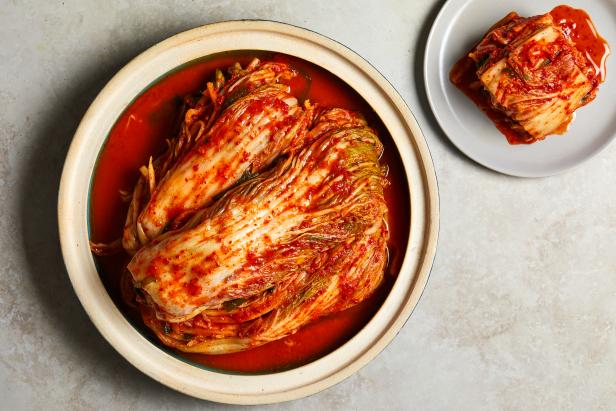
LUCY SCHAEFFER PHOTOGRAPHY / FOOD STYLING: JACKIE JI YOON PARK
Get the Recipe: Baechu Kimchi
Enjoy Fermented Foods: Refrigerated fermented foods are (almost!) magical. These foods reinforce the gut – and thus the immune system – with good bacteria. Scientists have shown that increasing the variety of good bacteria in the gut can help the body fight off more invaders, and thus tamp down on the inflammation they can cause.
Do this: Enjoy savory yogurt for breakfast: yogurt plus a drizzle of extra-virgin olive oil and a sprinkle of salt. Drink kefir. Try sauerkraut or kimchi. Mix miso with olive oil and toss it on roasted vegetables. Get fermented foods in your diet daily.
Choose Proteins with Benefits: Plant proteins are great for their antioxidant content, but animal proteins are also packed with antioxidants like selenium, zinc and B vitamins. Seafood contains selenium and inflammation-fighting omega-3 fats. Lean red meats like beef, venison and lamb are rich in zinc and B vitamins. Eggs are an important source of choline and the antioxidant lutein.
Do this: A tuna fish foil-packet counts as one easy serving. Meat may help you eat more veggies, so use it for loads of flavor in vegetable dishes. Eat seafood twice weekly, lean red meat once or twice a week if desired, an egg a day is okay.

Jonathan Knowles/Getty Images
What Foods Should You Skip to Avoid Inflammation?
Some foods feed the flames of inflammation; these foods are often ultra-processed and can include frozen entrees, commercial baked goods, condiments, fried foods, high-fat meats, excessive alcohol intake, some food additives and foods high in added sugars.
Serena Ball, MS, RD is a registered dietitian nutritionist, culinary instructor, and mom of five children. She blogs at TeaspoonOfSpice.com and is the author of the best-selling The 30-Minute Mediterranean Diet Cookbook, Easy Everyday Mediterranean Diet Cookbook and the newly-released The Sustainable Mediterranean Diet Cookbook. Follow her @TspCurry on Instagram.
Related Content:
